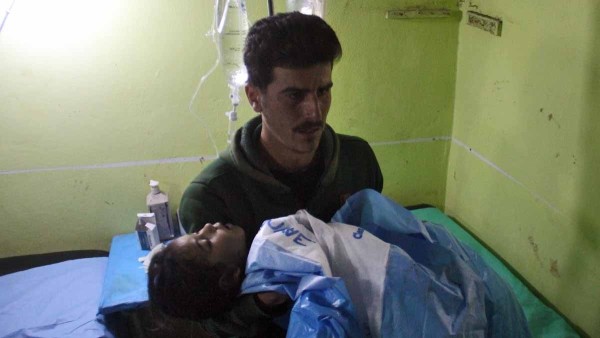Covering for regime attacks, Moscow insists, “Russia has been drawing attention for already three years but, to our deep regret, unsuccessfully to the incessant recurrences of chemical terrorism in Syria and Iraq”
LATEST
Russia pressed its campaign to divert attention from the Assad regime’s chemical attacks in Syria on Thursday, insisting that it is the West who is turning a blind eye to the assaults.
Foreign Ministry spokeswoman Maria Zakharova said on Thursday,
Russia has been drawing attention for already three years but, to our deep regret, unsuccessfully to the incessant recurrences of chemical terrorism in Syria and Iraq….
Our colleagues…are cynically shutting their eyes to numerous outrageous incidents with the use of chemical weapons by terrorist and extremist structures.
Moscow has worked for almost four years to protect the Assad regime from any consequences for its use of chemical weapons, from chlorine to a nerve agent such as sarin, such as the August 2013 attacks near Damascus that killed more than 1,400 people. For the last seven weeks, the Russians have concentrated on deflecting blame on the regime for the April 4 nerve-agent missile strike on the town of Khan Sheikhoun in northwest Syria, which killed at least 92 people and wounded almost 600.
Russia vetoed a UN Security Council resolution mandating that the regime cooperate with the Organization for the Prohibition of Chemical Weapons in a full investigation of the Khan Sheikhoun attack. However, with the OPCW saying again this week that it has been unable to launch an inquiry, Zakharova tried to turn any responsibility upon others:
We numerously urged partners at various international venues, first of all, in the UN Security Council and the OPCW to pull efforts to counter chemical terrorism. However, all our efforts either do not find proper support of colleagues from Western countries or are openly blocked by them.
Even as Zakharova said that the OPCW must now investigate in Khan Sheikhoun, the Russian Foreign Ministry turned against the independent, international body: “Further evasion of a full-fledged investigation will call into question the competence of Joint OPCW-UN and OPCW fact-finding missions and the relevance of their further existence.”
Zakhorova maintained that, despite numerous chlorine attacks — four of which have been officially been attributed to the Syrian military by the UN and OPCW — by the Syrian military since early 2014, it was the Assad regime who “displayed its political will in 2013 in its voluntary move to give up its military chemical potential”.
The spokeswoman tried to pre-empt any blame on the regime in the event that it again resorts to chemical weapons:
The number of incidents with the use of chemical substances will, unfortunately, only grow in this long-suffering country. It is not difficult to guess who will be blamed for them: of course, the talk will be about the armed forces and the government of Syria.
TOP PHOTO: Father holds the body of his child after the Assad regime’s nerve-agent attack on Khan Sheikhoun in northwest Syria, April 4, 2017
Pro-Assad Forces Advance in Central Desert as ISIS Withdraws
Pro-Assad forces have made a significant advance in central Syria’s desert with the withdrawal of Islamic State forces from the areas.
The regime’s military claimed that more than 1,000 square km (386 square miles) had been taken southeast of Palmyra, the Roman-era city recaptured from ISIS last year. Positions gained included phosphate mines that Iran wants to exploit.
S. #Syria: situation after #ISIS withdrew from all remaining areas SE of #Palmyra (1,000+ km²) in favor of pro-Regime forces. pic.twitter.com/VaSrSqnYlx
— Qalaat Al Mudiq (@QalaatAlMudiq) May 26, 2017
The advance revives the prospect of fighting between pro-Assad forces — including Hezbollah and Iranian-backed Iraqi militia — with US-supported Free Syrian Army units who have gained more than 2,500 square km from ISIS in the eastern desert, known as the Badia, in recent months.
Last week the US carried out its first airstrikes in support of the FSA against pro-Assad elements, striking a convoy that was advancing near the FSA base and American special forces close to the Iraqi border. Hezbollah and Iraqi militia suffered casualties and an armored vehicle and engineering trucks were destroyed; however, the offensive was renewed days later.
This week’s capture of ISIS territory also raises the prospect that rebels in the eastern Qalamoun region will be cut off and vulnerable to assault.
See Syria Daily: Pro-Assad Forces Advance Again Towards US-Supported Rebels in East
In response, Free Syrian Army units have announced the launch of Operation Badia Volcano to push back the pro-Assad forces. Clashes are reported east of the city of Suwaida.

